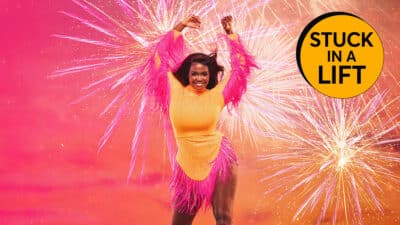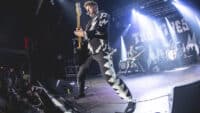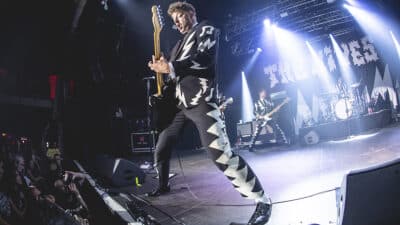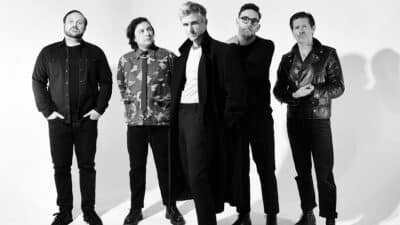Interview

Interview
Interview: Cavetown
The singer-songwriter talks his upcoming album, Worm Food, and why it’s so important to him to that he produces all his own music
Cavetown’s online community has a reputation for warmth and cosiness – easy to understand when faced with their gentle leader, a soft-spoken, level-headed boy of 23. Robin Skinner has been making and releasing music since he was 14, and over the past nine years he has carved out a corner of the internet that stands for all that his music represents. An escape from loneliness; someone to listen to the thoughts you have in the middle of the night.
Skinner’s new album, Worm Food, arrives on November 4. “I’m excited for people to hear the songs,” he says, “I’m excited to be able to start playing them live too. It’s always fun to play new songs. It can get a bit old, playing the same stuff for a long time.”
For Skinner perhaps, but not for his devoted fanbase, with whom every track has been warmly and lovingly received. There are those who have been with Skinner since the days of him self-releasing albums on Bandcamp, but there are also a multitude of new additions to the Cave Club; bedroom pop fans who have discovered him in recent years thanks to his steadily rising star. In both camps, positivity reigns.
“I’m also feeling really good about these songs,” he says, “So I’m looking forward to seeing what people think. There’re some that are obviously my favourites, and then there’s always an unexpected song that people really latch on to. And so I’m curious to see what people resonate with.”
Skinner is speaking to us just hours before his first tour date in Antwerp, days before returning to his native UK to play London’s Eventim Apollo, a gig that he’s trying hard not to think too much about.
“I don’t know…,” he says. “It’s pretty big! I usually can’t internalise important shows being important until I’m there. So I don’t know how I feel about it right now. I’m sure I’ll get super nervous and then have fun.” Is that the usual cycle, we ask? “On a good day, yeah,” he grins.
How would you describe your vision for this album?
I feel like I don’t really have visions for projects because I can’t keep my head in the same space for that long. It takes a year or two for me to write an album, so the idea that I would have had for it at the start is going to be completely different by the end. Usually, I’ll just write songs, and once there’s a good album length amount, then that’s the album. Then near the end, once I start to get like art together and do music videos and stuff, it starts to form its own identity, I guess. I feel like it creates its own thing. It becomes what it wants to be. It doesn’t feel intentional – it just feels like a natural process.
That’s something that I feel like your fan base has really resonated with over the years – that immediacy and vulnerability in your writing. Is it ever difficult to write in that way?
I don’t think so. Because when I’m writing, I don’t find myself thinking too much about it or censoring myself or thinking of the end product necessarily. I get very in the zone and it’s just me in my studio and that’s kind of how it’s always been. I’m glad that I haven’t been able to manage to lose that yet. Yet!
Is there a risk of that happening?
I don’t know, maybe. I feel like I’ve been very lucky that my team and my label have been super respectful of how I’ve always wanted to work. I’ve never been forced to work with other writers or producers or anything like that. I could definitely see that happening if I was to invite outside people into my writing space. I think as long as it stays just my thing and it’s like my little private writing time, I don’t see that going away.
So you don’t really work with co-writers or co-producers much at all?
No, not at all. Sometimes I’ll invite friends or artists, like semi acquaintances, if I’m stuck on a verse, or if I just would really like them to be involved. And a few times on this album I’ve asked for some producing help on things that maybe I don’t feel as sure of. Drums especially are really hard for me to mix. But I definitely prefer to be in control of everything – kind of to my detriment, because it’s been really hard for me to ask for help. I feel very like, “Ah no, it’s mine, I don’t want you to ruin it”.
But I definitely had some good production learning experiences on this album. A producer that I hung out with for a bit in New York called Jake Aron helped me out with some drum mixing. I sat with him and shadowed him a bit. It was kind of a teaching moment rather than him just doing it for me, which I really appreciated. I’m hoping that if I can keep asking for help when I need it in those places, maybe I won’t have to ask again in the future. I work with people, especially on the production side, with the intent of learning from it and then being able to do it on my own rather than wanting to work with other people a lot.
Is it true that you were initially a bit wary about signing to a major label for that reason?
I was. But I always had lots of trust in my manager. He’s always known what I needed from a label, so he’s been very good at kind of advocating for me in that sense. A big part of it is that I liked the way I’m doing things currently and I want to keep doing them that way. That would have been my main concern, but I wasn’t too worried about it, because my manager has always been good at making sure I’m happy.
You’ve released two different versions of your lead single ‘Fall In Love With A Girl’ – one with Beabadoobee, and then a very different version with Orla Gartland. How did that come about?
Well, the one with Bea… We were both living in London at the time, and we’d been meaning to hang out and work on things together for a long time. And then COVID happened so it was hard to connect again. But we did, and she came around to my house. I’d started writing ‘Fall In Love With A Girl’ and I was like, “This feels heavily inspired by Bea’s music to me, and I feel her voice would work really well on it. I want to see what she makes it.” I think I’d gotten a little bit stuck and we just kind of worked through it together and tracked her vocals. It was just the same way that I like to do it – just in my house, very kind of DIY. And we had a nice time.
Sometimes with songs that I’ve felt really happy about or really proud of, I like to kind of give them a new life and do a ‘version 2’ or whatever. I’ve done that a lot with songs that maybe I’ve looked back at and not be too happy with the way I produced them, or when I just hear things that I might do differently now. I wanted to do a similar thing. Not that I wasn’t proud of the production of ‘Fall In Love With A Girl’, but I could hear all these acoustic things that I could do for another version. And it made sense if I was doing a new version to look for another artist who could add their own twist to it. Me and Orla have been mutuals for a long time, and we were supposed to do a Europe tour when COVID happened. This tour is gonna be the first time that we’re going to actually get to play together, which will be cool. I’m excited to try and sing it live with her as well.
You and Orla both gained large followings on social media early on in your careers. What kind of relationship would you say you had with social media these days?
Oh, these days it’s definitely very different from when I started. I remember I got Twitter when I was 12. Growing up, especially in secondary school, I didn’t really have much of a friend group. Most of my socialising, if not all of it, was on online. That’s where I met a lot of my friends – when I got into Twitter, YouTube and Bandcamp and stuff – from spending all of my time online at secondary school. I definitely tweeted too much. I would reach tweet limit, like every day, which is like something like 1000 tweets. I would tweet my every single thought that I could possibly have, just because I didn’t have friends to say those things out loud to.
I definitely don’t do that now. Slowly, as I gained more followers that weren’t people that were in my friend group on Twitter. I was like, “Okay, maybe I need to start thinking more about what I write, and not just do it every time I have a thought.” I’m definitely a lot more mindful now of the fact that the stuff I tweet has meaning and that people are going to see it. I also don’t want to be annoying, you know? I don’t want to tweet every two seconds. But also, I feel like I don’t need that outlet anymore. Because through my music, I’ve found friends in person.
Do you ever miss the days where you could tweet 1000 times a day and not worry about who would see it?
I don’t know. I don’t think I do. Because I just remember that as a very lonely time. I think I’m glad that I don’t feel like I need that anymore.
Do you ever feel the negative effects of being followed so closely by fans, or is it an overwhelmingly positive experience having that community?
It can be overwhelming in both positive and negative ways. Going from being a teenager and being so lonely and not feeling like I had people to talk to, to having so many eyes on me still feels really weird to me a lot of the time. I don’t know if I’ll ever really get used to it necessarily.
I’m trying to find ways to keep on interacting with my audience in a way that isn’t overwhelming. We’ve got a Discord server. That’s kind of a smaller community of people that I can interact with more closely without feeling like there’s too many people. I miss the days where I could remember everyone and could reply to everyone – it’s just too overwhelming to try and do that again.
You grew up with two classical musicians as parents. How did that influence your relationship with music?
They’ve always been very supportive of me. A lot of musicians have parents who don’t want them to pursue any kind of art, really. They never necessarily pushed me towards it – I think I was just naturally interested in it, I guess, partially from being surrounded by it. But they were always very, very willing to help support me with whatever instruments I wanted to learn or with any equipment that was needed for producing.
And when you started making your own music, how did you land on Cavetown as a stage name?
I wish I had a cooler origin story… When I was like, 13, I remember tweeting my thought process (naturally) and I wanted a combination of two words that would sound snappy together. I found the thread of it about a year ago and it was just me tweeting combinations of words. I arrived at Cavetown and I was like, this sounds kind of cool. I’m so glad I chose that, because the others were super emo and cringy. I’m glad that I came up with something that I still think sounds kind of cool.
You released your first album on Bandcamp at the age of 14. What can you remember about putting that album together?
Not a whole lot. I made it on GarageBand, and I started using Bandcamp, mainly because I had a bunch of friends on Twitter who were doing music and sharing their stuff there. It was kind of a way to show them what I was making. And I’d also found some other artists on there like Spooky Ghost Boy and Fox Academy, who were my favorites at the time. I looked up to them a lot. A lot of their style came through in those early albums, like very low fi, vibey stuff.
I think I was still borrowing my mom’s microphone, like a tiny little microphone that she would use to record stuff for her students. And I would like use my hand as a pop filter. Like sing through my fingers.
Does that work?!
Yeah, it does! Most people use a sock, which I think makes more sense. But what I used to do is to have my fingers just slightly apart to get the sound through, but it catches the breath a little bit.
How has your approach to making music changed over the last nine years?
I definitely have more equipment. I’ve basically just upgraded stuff that I’ve been used to using. My first microphone, that was mine and not my mom’s, was an Audio Technica USB mic. Then when I started using electric guitars I decided to upgrade to the closest thing that Audia Technica had that would go through an interface rather than a USB. But I still just use an Audio Technica mic, and it just works for me. A lot of the time, it’s maybe not the most efficient way to do things. But I’m very much like, “if it works, then it works”. I’m not going to seek out a way to change things too much.
I think the main difference is that I stopped working from my bedroom. When I moved to London at the beginning of lockdown it was the first time I had lived away from my parents. I was able to move my studio into a separate room from my bedroom, which helped a lot to separate work from resting and stuff. I used to just mix and record from my bed a lot of the time, which I think isn’t very healthy. Then when I moved away from London I was able to build a studio at the back of my garden. It’s like an entirely different building, which is really helpful for me to get in the zone when I go over there. I can leave my house and go to the studio and I’m like, “This is my work area,” and then I come back into the house and I feel like I’ve just been to work, and it helps me feel like I’ve been more productive.
That shift from music being a hobby to a full-time career – has that changed your creative process at all?
There were times where I had to work differently – for Sleepyhead I was touring whilst working on the album – and it’s possible for me to do that, but I definitely think I work better when I’m sticking to what’s worked for me before, which is working from home and having very little distraction. I’ve made an effort to try and do that for this album too. I’ve learnt that having to work on tour doesn’t work for me, and it just created too much stress. I definitely feel very attached to the way that I’ve always written and produced. It works, you know?
Worm Food is out now. Get tickets for Cavetown’s 2023 UK tour here.









